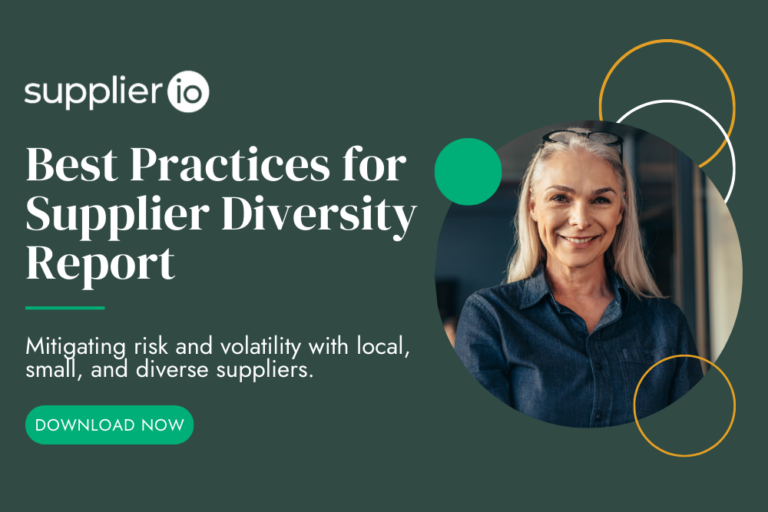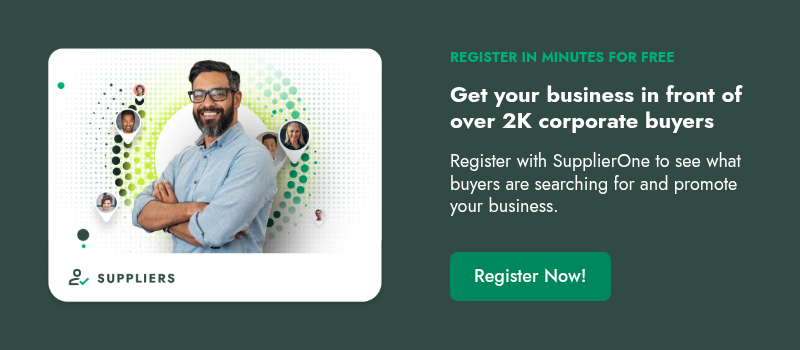Approximately 99.9 percent of all U.S. businesses are small businesses – nearly 30 million —and eight million of those are classified as diverse businesses, including veteran-owned firms.
According to the Small Business Administration and census estimates, veteran-owned firms showed receipts of $1.14 trillion, an aggregate annual payroll of $195 billion, and employed over five million people in 2012. Approximately 7.3 percent of those veterans reported having a service-connected disability.
The Federal Government has a long history of supporting veteran-owned businesses through set-aside and sole-source contracts, as well as through education and training initiatives. Now corporate America is recognizing the importance of including veteran-owned businesses in their supply chains.
In 2017, The Billion Dollar Roundtable expanded their criteria of diverse businesses that counted toward a corporation’s billion-dollar supply chain spend on diverse-owned businesses to include Service-Disabled Veteran Disability-Owned Business Enterprises (SDV-DOBEs) and Veteran-Disability Owned Business Enterprises (V-DOBEs).
Read on to learn more about what will classify a business as minority-owned and the resources available to certified VBEs.
What is a Veteran-Owned Business?
There are three types of VBEs: Veteran-Owned Business Enterprise (VBE), Disabled Veteran-Owned Business Enterprise (V-DOBE), and Service-Disabled Veteran-Owned Business Enterprise (SDV-DOBE). A possible secondary certification as an 8(a) business may also apply. Check the requirements below to see which category or categories will fit your business.
How to become Veteran-Owned Business?
Finding out how you can become one of the various types of veteran-owned or veteran-owned small businesses then check out each individual requirement below.
Veteran-Owned Business Enterprise (VBE) Requirements
A VBE is defined as:
- At least 51 percent of the business must be directly and unconditionally owned by one or more veteran(s) or service-disabled veteran(s).
- The veteran owner(s) must have full control over the day-to-day management, decision-making, and strategic policy of the business. The owner must also possess managerial experience of the extent and complexity needed to manage the business, be the highest-compensated employee (unless the veteran can explain lower compensation as a benefit to the business), devote full-time work to the business, hold the highest officer position in the business, and be able to exercise independent business judgment.
- A veteran is a person who has served on active duty with the Army, Air Force, Navy, Marine Corps, or Coast Guard for any length of time and who was discharged or released under conditions other than dishonorable. Reservists or members of the National Guard called to federal active duty, or disabled from a disease or injury incurred or aggravated in the line of duty or while in training status, also qualify as veterans.
Veteran-Disability Owned Business Enterprise (V-DOBE) Requirements
All DOBE requirements plus:
- Business is 51 percent owned, controlled, operated, and managed by a veteran, but disability was not incurred during their time of service.
Service-Disabled Veteran-Owned Small Business (SDV-DOBE) Requirements
The government limits competition for certain contracts to businesses that participate in the Service-Disabled Veteran-Owned Small Business program.
Joining the disabled veterans’ business program makes your business eligible to compete for the program’s set-aside contracts. You can still compete for contract awards under other socioeconomic programs you qualify for.
How to register as a service disabled veteran owned business
To qualify for the service-disabled veterans’ business program, your business must:
- Be a small business.
- Be at least 51 percent owned and controlled by one or more service-disabled veterans.
- Have one or more service-disabled veterans manage day-to-day operations and also make long-term decisions.
- Eligible veterans must have sustained their disability during their time of service.
NOTE: The SBA does not have a separate DOBE designation, however they do have a SDV-DOBE category.
8(a) Economically Disadvantaged Small Business Requirements
Note: The 8(a) program is not restricted to veterans, but if you qualify, it does offer additional opportunities and assistance.
The federal government tries to award at least five percent of all federal contracting dollars to small disadvantaged businesses each year through the 8(a) program.
To qualify for the 8(a) program, follow this eligibility checklist:
- Be a small business.
- Has not previously participated in the 8(a) program.
- Be at least 51 percent owned and controlled by U.S. citizens who are economically and socially disadvantaged.
- Be owned by someone whose average adjusted gross income for three years is $250,000 or less.
- Be owned by someone with $4 million or less in assets.
- Have the owner manage day-to-day operations and also make long-term decisions.
- Have all its principals demonstrate good character.
- Show potential for success and be able to perform successfully on contracts.
More information about small business categories can be found on the Small Business Administration’s website.
Becoming Certified as a Veteran-Owned Business
If you meet the requirements to be considered a VBE, V-DOBE, or SDV-DOBE, your next step is to become certified.
But how to register veteran owned business?
There are two types of certification: federal certification and third-party certification.
The Federal Government requires certification through their own process to be eligible for set-aside contracts.
Third-party certification provides corporate supplier diversity programs the assurance that an independent, nationally-recognized agency vetted your company and verified your veteran-owned status.
Note: Self-certification as a VBE is obsolete.
Third-Party Certification
The National Veteran Business Association (NaVOBA) and the National Veteran-Owned Business Development Council (NVBDC) both independently certify veteran-owned businesses of all sizes.
Learn more about the NaVOBA certification process here.
Learn more about the NVBDC certification process here.
Veterans First Verification
If you wish to compete for set-aside and sole source contracts made available through Veterans First Contracting Program of the U.S. Department of Veterans’ Affairs (VA), you must be verified through the Center for Verification and Evaluation. This is a federal program with regulations set out under federal law that address veteran eligibility, ownership, and control; it is for small businesses only.
Learn more about Veterans First Verification and how you can receive assistance achieving verification here.
Education, Funding, and Contracting Resources
Education and Training
Fortunately, both government and private institutions realize the value of supplier diversity and are investing in supplier development. Whether you’re just beginning your business or you’ve been around a while, these educational resources are sure to help. Or check out our article top resources available for veteran owned businesses.
Office of Veterans Business Development (OVBD)
The OVBD is a subsidiary of the U.S. Small Business Administration (SBA) designed to connect veterans and their spouses with resources to start or grow their own business(es). Initiatives include Boots to Business, which assists active military personnel in transitioning to civilian entrepreneurship; the Veterans Business Outreach Center (VBOC) Program which provides entrepreneurial development services such as business training, counseling, and resource partner referrals; and Veteran Women Igniting the Spirit of Entrepreneurship (V-WISE) which helps women veterans and female military spouses/partners launch and grow their own businesses.
Learn more about the resources available from the OVBD here.
Veteran Entrepreneur Training Symposium (VETS)
VETS is an annual business development conference designed to provide VBEs with the knowledge and relationships needed to service the Federal Government. Highlights include one-on-one business sessions connecting VBEs with government agencies, prime contractors, and large or medium-size businesses, sessions on how to navigate the federal acquisition process, and a trade show.
Learn more about VETS here.
National Veteran Owned Business Development Council (NVBDC)
In addition to providing third-party certification, the NVBDC hosts several education and training events as well as matchmaking and networking events. From working with the Federal Reserve Bank to co-hosting the national Keeping the Promise conference with the U.S. Veteran Business Alliance, the NVBDC offers multiple opportunities for training and education.
Learn more about the NVBDC here.
U.S. Veteran Business Alliance (USVBA)
The USVBA began as an entity to assist California-based VBEs obtain state contracts and has since expanded nationwide. A main focus of the USVBA is its mentorship program, which matches experienced U.S. veteran business owners in partnership with prospective fellow veteran entrepreneurs.
Learn more about the USVBA here.
Institute for Veterans and Military Families (IVMF)
IVMF is an interdisciplinary academic institute, headquartered at Syracuse University and focused on advancing the lives of United States’ military veterans and their families. Among other initiatives, IVMF provides unique, innovative programs in career, vocations, and entrepreneurship education to active military, veterans, and their spouses/partners.
Learn more about IVMF’s initiatives here.
Veteran Women Igniting the Spirit of Entrepreneurship (V-WISE)
V-WISE is a training program in entrepreneurship and small business management specifically designed for women veterans and female military spouses/partners. The three-phase program includes a fifteen-day online course (Phase I), three-day in-person entrepreneurship training event held in different parts of the country (Phase II), and ongoing mentorship, training and support opportunities for V-WISE graduates (Phase III).
V-WISE is operated by the Institute for Veterans and Military Families at Syracuse University (IVMF) in cooperation with the SBA.
Learn more about V-WISE here.
Bunker Labs
Bunker Labs is a non-profit organization created by veterans to assist other veterans in starting and growing their businesses. Through its online entrepreneurship challenge, Bunker in a Box, the organization offers hundreds of hours of entrepreneurship training and education as well as interviews with military veterans who have successfully transitioned to civilian life and started their own businesses.
Learn more about Bunker Labs here.
SCORE
For over 50 years, non-profit SCORE has been helping small businesses (including veteran-owned) get off the ground through education and mentorship.
Because they are supported by the SBA, veteran-owned businesses can take advantage of SCORE services at no charge or at a very low cost. Visit SCORE’s website to find more information on mentors, workshops, and other available resources.
8(a) Business Development Program
The 8(a) Program is a business assistance program designed specifically for small disadvantaged businesses. The program is government-sponsored, highly involved, and has some inspiring success stories. Participants of the program go through a four-year developmental stage followed by a five-year transition stage. In addition to the nine-year program, participants have access to specialized business training, marketing assistance, and mentorship programs, to name a few.
Find out how your 8(a) minority-owned business can participate here.
Funding
Access to capital is one of the main obstacles to business equality. The Federal Government offers several forms of assistance for VBEs to secure funding through loans and grants. And thanks to the global reach of the internet, crowdfunding has simplified access to millions of small investors as well.
Small Business Administration (SBA) Guaranteed Loans
One of the many resources the Small Business Administration provides is access to loans; however, the SBA does not loan money directly to small businesses. Instead, the Administration establishes loan guidelines with partnering lenders around the country. The SBA guarantees these loans will be paid, which means small businesses (like you) generally receive lower, more competitive rates and fees compared to non-guaranteed loans. Find more information about SBA-guaranteed loans.
USA.gov
Aside from the SBA, the United States offers other government-backed loans and funding resources. You can find more detail on how to get funding or grants for an 8(a) categorized business here.
Crowdfunding
As the name suggests, crowdfunding is used by businesses to pull small investments from a large number of investors – unlike traditional investments made by a handful of people. Many small businesses have found success exercising this type of investment strategy.
Crowdfunding sites have become an increasingly popular way to raise money for business ideas ranging from video games to backpacks to feature films to beehives. The SBA provides more detail on how to successfully crowdfund for your minority-owned.
Contracting Opportunities
Both the Federal Government and many of America’s top corporations require their procurement departments to spend a certain percentage with diverse suppliers every year. Once you are certified as a VBE, it’s time to leverage that certification to gain access to contracting opportunities.
Supplier Registration Platforms
To streamline supplier diversity, blue chip firms invest in third-party supplier registration portals to streamline the buyer-supplier contracting process.
Free registration, seamless communication with potential buyers, and robust opportunity filtering are just a few features that a quality platform should provide to suppliers. Register your company today to start on the path toward working with Fortune 1000 companies.
Veterans First Contracting Program
The Department of Veterans Affairs, which awards a large amount of contracts to veterans, sets aside contracts for veterans through their Veterans First Contracting Program. Note that this program is not the same as the SBA’s program for SDV-DOBEs. To get access to set-aside Veterans Affairs contracts, your business must be verified through the Vets First Verification Program.
National Veterans Small Business Engagement (NVSBE)
The NVSBE is the largest procurement event directly connecting veteran-owned businesses with federal and commercial buyers. It is the signature event for VA Small and Veteran Business Programs, providing matchmaking, networking, and development opportunities for VBEs.
National Veterans Small Business Coalition (NVSBC)
The NVSBC serves as an advocate to ensure that veteran-owned businesses are given first consideration for federal prime and subcontracting procurement opportunities. The organization consults with the Federal Government, hosts an annual business development conference, and provides information and advice about how to work with the Federal Government.
Learn more about the NVSBC here.
Veteran Institute for Procurement (VIP)
VIP is designed specifically for VBEs seeking to work with the Federal Government. The organization offers three training programs for businesses at various stages, from those wanting to enter the federal market to those looking to expand within the federal marketplace to companies ready to go global.
Learn more about VIP here.
8(a) Business Development Program
Small disadvantaged businesses participants may be eligible for sole-source contracts, up to $4 million for goods and services and up to $6.5 million for manufacturing, through the 8(a) program.
Potentially, an even greater aspect of the 8(a) program is a participant’s ability to form a joint venture or team to bid on contracts. This gives 8(a) firms the ability to fulfill larger contracts that they may not be able to handle alone, while also developing industry relationships. Interested in learning more about the 8(a) Program and its requirements? Find that information here.
HUBZone Program
Short for Historically Underutilized Business Zone, the SBA created this HUBZone program to assist businesses in economically depressed areas who often face greater business disadvantages.
While not restricted to veteran-owned businesses, the HUBZone program can be a boon to your firm if you qualify.




